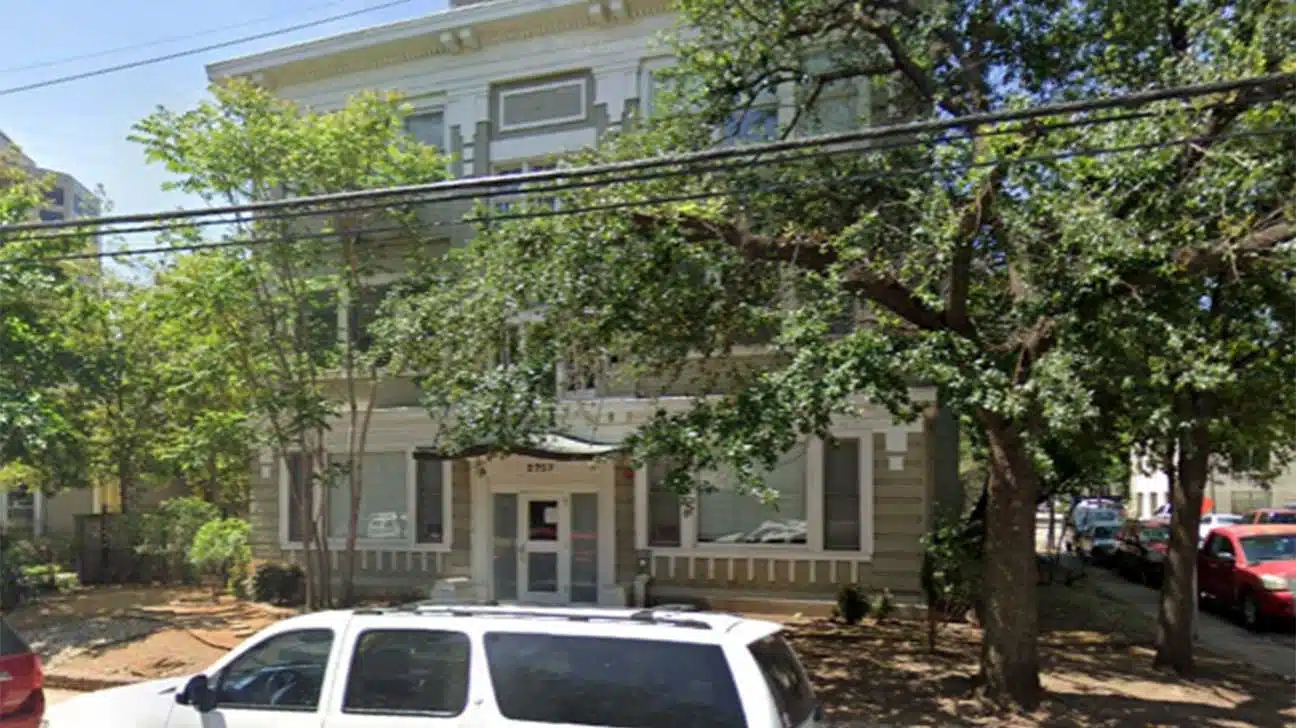
People searching for addiction rehab services in Texas have many quality options for care throughout the greater Dallas area.
These rehab centers use evidence-based therapies, holistic approaches, and personalized plans to ensure the physical, mental, and emotional aspects of addiction are addressed.
List Of Substance Abuse Recovery Facilities In Dallas County, Texas
Our team chose the following treatment programs based on their licensing, affiliations, LegitScript certification, accreditation, client testimonials, Google ratings, and more.
1. Cenikor/Turtle Creek Recovery Center, Dallas, Texas
Cenikor Dallas is a prominent drug and alcohol rehab center in Dallas, TX. It has been around for more than 50 years and is known for providing high-quality services to clients in need.
Services offered here include:
- residential treatment
- outpatient treatment programs
- individual counseling
- group therapy services
- medication-assisted treatment (MAT)
- job training and educational services
- aftercare support
- transitional housing
- family support services
- holistic options
- mental health care for co-occurring disorders
This facility accepts Medicaid, Medicare, and Veterans Affairs health insurance plans and has received accreditation by the Committee on Accreditation of Rehabilitation Facilities (CARF).
Location and contact information:
2707 Routh St.
Dallas, TX 75201
(214) 871-2483
2. Life’s Second Chance Treatment Center, Dallas, Texas
Life’s Second Chance Treatment Center provides outpatient rehab services to adults with opioid use disorders.
Clients can receive MAT with methadone or Suboxone, individual or group counseling, relapse prevention, case management, and other services.
This facility also has special programs for pregnant women. The quality of care is backed by positive client testimonials, licensing, and a 4.8-star Google rating.
Location and contact information:
2615 S. Lancaster Rd.
Dallas, TX 75216
(855) 662-9310
3. Lighthouse Recovery, Dallas, Texas
Lighthouse Recovery is one of the top-rated rehab programs in Dallas. Their services range from a partial hospitalization program (PHP) to intensive outpatient programs (IOP) and sober living.
While in this program, you’ll encounter:
- peer support groups
- individual counseling
- dual diagnosis care
- life skills training
- holistic treatments
- extended care programming
- recovery coaching
- aftercare
Lighthouse has been rated a Top Addiction Treatment Center by Newsweek in addition to holding Joint Commission accreditation and a 5-star Google rating.
Location and contact information:
5344 Alpha Rd.
Dallas, TX 75240
(214) 396-0259
Mental Health And Addiction Treatment Services In Dallas County, Texas
Receiving the right behavioral health treatments can be a critical component of addressing addiction and other mental health disorders.
The majority of drug and alcohol abuse treatment facilities you encounter will tailor the methods listed below to your individual needs.
You may also find programs that utilize holistic therapies for wellness, including yoga, meditation, acupuncture, reiki, or art therapy.
Behavioral health treatment options include:
- detoxification
- intervention services
- inpatient treatment
- crisis helplines
- MAT with buprenorphine or naloxone
- 12-step meetings
- behavioral therapy options
- case management
- IOP and PHP
- low-intensity outpatient services
- dual diagnosis treatment for co-occurring disorders
- family counseling
- support groups
- sober living
- primary healthcare services
- relapse prevention
- referrals to other levels of care
- aftercare planning
Factors To Consider When Selecting A Dallas County, Texas Drug Rehab Center
It’s important to look at the treatment plans and level of care offered. People with more severe addictions have a higher chance of needing a medical detox center or inpatient services.
Next, consider the location and setting of the facility. You can also check for accreditation, licensing, and the experience or qualifications of the staff.
One of the most important factors is payment. Many facilities only accept private health insurance, but the best way to verify coverage is to call your insurance providers or the center.
FAQs About Dallas County, Texas Substance Abuse Treatment Programs
If you have questions during your search for addiction recovery, the answers below may be able to help.
Are There Gender-Specific Drug Addiction Programs In Dallas County, Texas?
Yes, you can find gender-specific drug treatment and inpatient rehab centers throughout Dallas County.
These programs are designed to meet gender-specific needs and create a destigmatized environment where clients feel comfortable discussing sensitive issues.
Can I Find LGBTQ+-Friendly Rehab Centers In Dallas County, Texas?
Yes, there are queer-friendly recovery centers in Dallas County. Trauma-informed care and other services can provide a judgment-free place for treatment.
What Addictions Are Treated In Dallas County, Texas, Recovery Programs?
You can find help for many substance use disorders in Dallas County, including prescription painkiller abuse or stimulant addiction involving methamphetamine and cocaine.
Some facilities also offer help for behavioral addictions like gambling.
Get Help For A Substance Use Disorder In Texas
If you or a loved one are experiencing drug abuse or alcohol dependency, you are not alone. To learn more about beginning addiction recovery, contact us today.
Cities In And Around Dallas County, Texas:
Published on April 24, 2023
Addiction Resource aims to provide only the most current, accurate information in regards to addiction and addiction treatment, which means we only reference the most credible sources available.
These include peer-reviewed journals, government entities and academic institutions, and leaders in addiction healthcare and advocacy. Learn more about how we safeguard our content by viewing our editorial policy.
- Substance Abuse and Mental Health Services Administration (SAMHSA) – Find Treatment
https://www.samhsa.gov/find-treatment - Texas Health and Human Services – Adult Substance Use Services
https://www.hhs.texas.gov/services/mental-health-substance-use/adult-substance-use-services - University of Texas at Austin – State of Texas Drug Use Patterns and Trends
https://socialwork.utexas.edu/wp-content/uploads/2020/09/Texas-Substance-abuse-trends-2019.pdf


